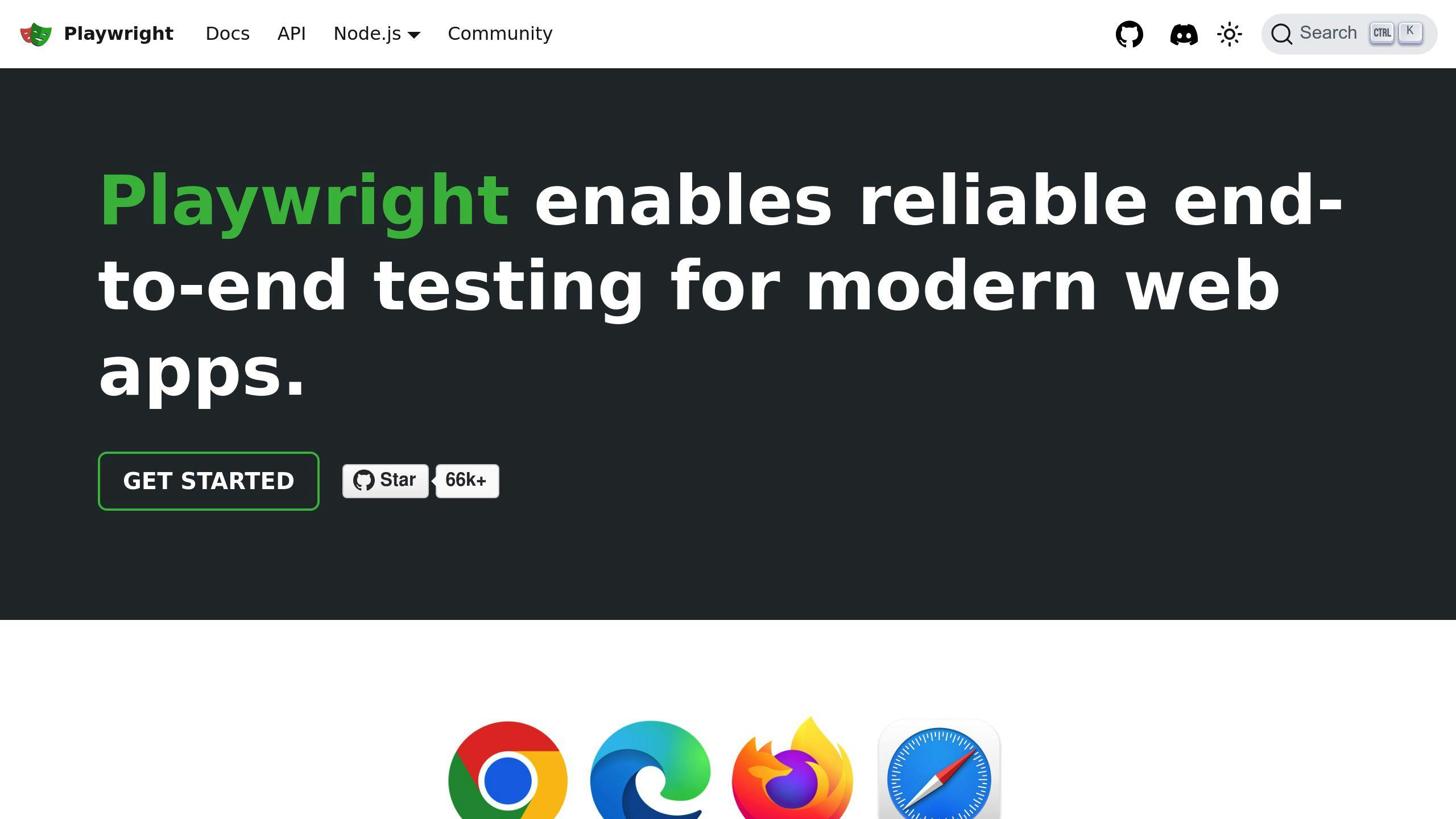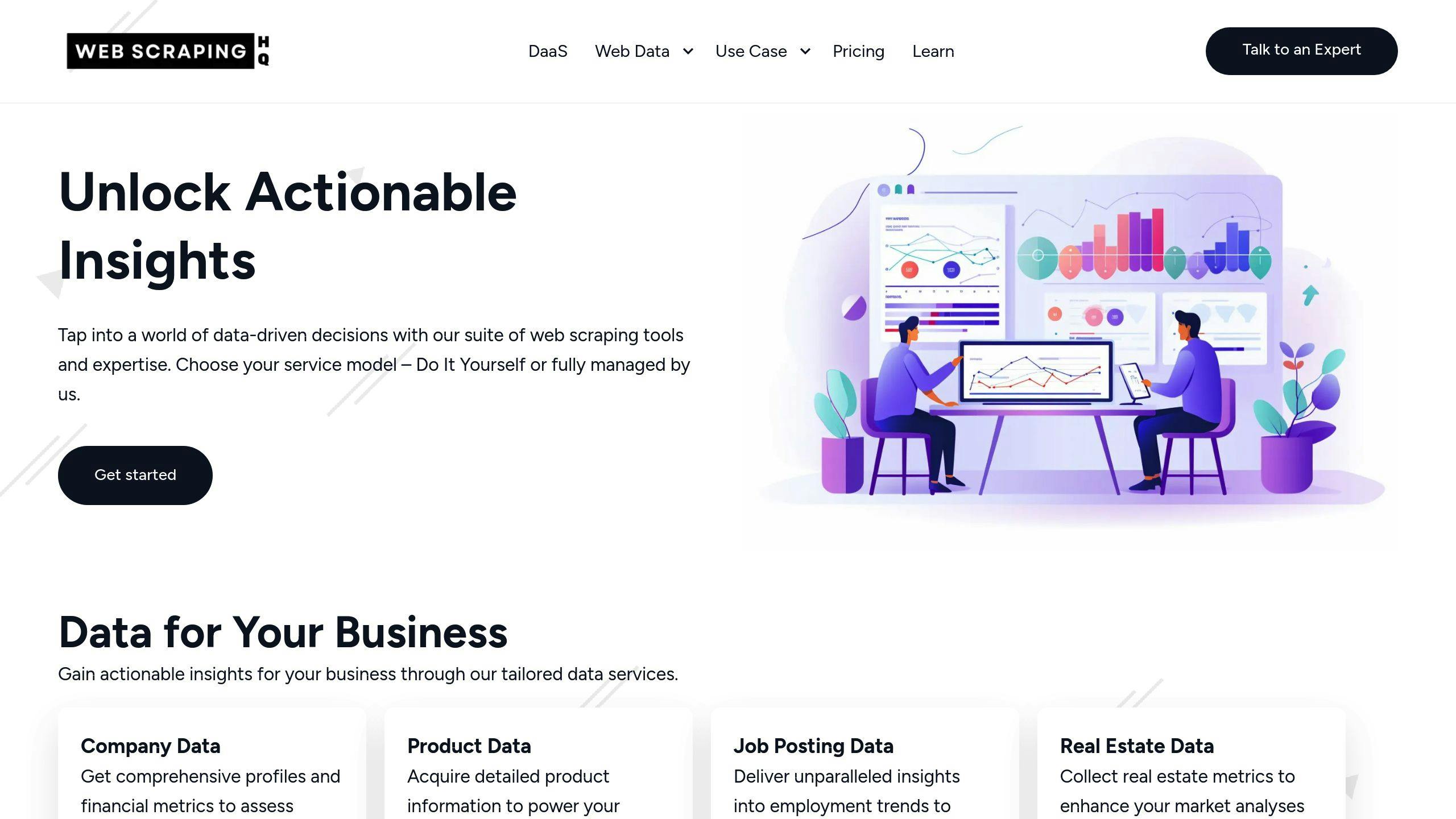
- Harsh Maur
- December 4, 2024
- 8 Mins read
- Scraping
JavaScript Web Scraping with Playwright: Beginner Guide
Want to scrape websites efficiently? Playwright, a JavaScript-based tool, makes web scraping simple and effective. Here's what you’ll learn:
- What is Web Scraping? Automating data collection from websites using tools like Playwright.
- Why Playwright? It handles dynamic websites, supports multiple browsers, and operates in headless mode for better performance.
- How to Get Started: Install Playwright with Node.js, set up a basic project, and start scraping.
- Key Techniques: Learn to load pages, find elements, extract data, and handle dynamic content.
- Advanced Tips: Manage infinite scrolling, scrape multiple pages, and optimize performance with retry logic and resource blocking.
The playwright is beginner-friendly and powerful enough for complex tasks. Whether you're scraping e-commerce prices or gathering data for analysis, this guide equips you with the essentials to get started.
Scraping with Playwright 101 - Easy Mode

How to Set Up Playwright for Web Scraping
To get started with Playwright, you'll need to have Node.js and npm (Node Package Manager) installed on your system.
Installing Playwright
Install Playwright along with its browser files by running the following command:
npm init playwright@latest
This will set up everything you need, including the required browser components.
Setting Up a Basic Playwright Project
Here's a simple structure for a Playwright web scraping script:
const { chromium } = require('playwright');
async function startScraping() {
// Launch the browser in headless mode for better performance
const browser = await chromium.launch({ headless: true });
// Open a new page and navigate to the target URL
const page = await browser.newPage();
await page.goto('https://example.com');
// Add your scraping logic here
await browser.close();
}
startScraping();
To manage dynamic content effectively, you can use waiting mechanisms like these:
// Wait for a specific element to load
await page.waitForSelector('.target-element');
// Wait for network activity to finish
await page.waitForLoadState('networkidle');
It's also a good idea to include basic error handling to tackle navigation problems:
try {
await page.goto('https://example.com');
} catch (error) {
console.error('Navigation failed:', error);
}
This setup takes advantage of Playwright's robust features for working with dynamic and modern web pages. If you'd prefer a pre-configured solution, tools like Webscraping HQ offer ready-to-use environments tailored for efficient and compliant web scraping.
With Playwright installed and configured, you're all set to dive into core web scraping techniques in the next section.
Essential Web Scraping Techniques with Playwright
Playwright's API makes web scraping easier, helping developers tackle complex tasks with less hassle.
Loading a Web Page
To begin, load the webpage you want to scrape:
const { chromium } = require('playwright');
async function scrapePage() {
const browser = await chromium.launch();
const page = await browser.newPage();
try {
await page.goto('https://example.com', {
waitUntil: 'networkidle',
timeout: 30000
});
} catch (error) {
console.error('Failed to load the page:', error);
}
}
Finding Elements on a Page
Once the page loads, locate the elements you need for extracting data. The playwright supports various methods for this:
// Using CSS selectors
const headingByCSS = await page.$('h1.main-title');
// Using XPath
const buttonByXPath = await page.$('//button[@id="submit"]');
// Using text content
const elementByText = await page.getByText('Login');
For more precision, you can use role-based selectors:
// Find a button by its role and name
const submitButton = await page.getByRole('button', { name: 'Submit' });
// Find an input field by its label
const emailInput = await page.getByLabel('Email address');
Extracting Data from Web Elements
After locating elements, extract the required data using these techniques:
// Extract text and attributes
const data = await page.$eval('h1', el => ({
title: el.textContent,
imageUrl: el.querySelector('img').src
}));
// Extract multiple links
const links = await page.$$eval('a', elements =>
elements.map(el => ({
text: el.textContent,
href: el.href
}))
);
Here’s an example of scraping product information:
async function scrapeProductInfo(page) {
const productData = await page.$eval('.product-card', element => ({
title: element.querySelector('.title').textContent.trim(),
price: element.querySelector('.price').textContent.trim()
}));
return productData;
}
sbb-itb-65bdb53
Advanced Web Scraping Tips with Playwright
Now that you’ve got the basics down, let’s dive into techniques for handling dynamic content, scraping multiple pages, and boosting performance.
Handling Dynamic Content
Scraping AJAX-heavy pages or infinite scroll setups? Here’s how you can manage it:
async function scrapeDynamicContent() {
const browser = await chromium.launch();
const page = await browser.newPage();
try {
await page.goto('https://example.com');
await page.waitForSelector('#dynamicElement', {
state: 'visible',
timeout: 5000
});
// Manage infinite scrolling
await page.evaluate(() => {
window.scrollTo(0, document.body.scrollHeight);
});
await page.waitForResponse(response =>
response.url().includes('api/content')
);
} catch (error) {
console.error('Dynamic content error:', error);
}
}
Scraping Across Multiple Pages
When dealing with paginated data, efficiency is key. Here’s a streamlined approach:
async function scrapeMultiplePages() {
const browser = await chromium.launch();
const page = await browser.newPage();
const baseUrl = 'https://example.com/page/';
for (let pageNum = 1; pageNum <= 5; pageNum++) {
await page.goto(`${baseUrl}${pageNum}`);
await page.waitForSelector('.content-loaded');
const data = await page.$eval('.content', el => el.textContent);
console.log(`Page ${pageNum} data:`, data);
await page.waitForTimeout(Math.random() * 2000 + 1000); // Add random delay
}
}
Improving Performance and Error Handling
Want a faster and more reliable scraping process? Try this:
const playwright = require('playwright');
async function optimizedScraping() {
const browser = await playwright.chromium.launch({
headless: true,
args: ['--disable-gpu', '--no-sandbox']
});
const context = await browser.newContext({
userAgent: 'Mozilla/5.0 (Windows NT 10.0; Win64; x64) Chrome/96.0.4664.110',
viewport: { width: 1920, height: 1080 }
});
const page = await context.newPage();
// Block unnecessary resources for better speed
await page.route('**/*.{png,jpg,jpeg,gif,svg,css,font}',
route => route.abort()
);
try {
await page.goto('https://example.com');
// Retry logic for failed operations
for (let attempt = 1; attempt <= 3; attempt++) {
try {
return await scrapeData(page);
} catch (error) {
if (attempt === 3) throw error;
await page.waitForTimeout(1000 * attempt);
}
}
} catch (error) {
console.error('Scraping error:', error);
}
}
Here are some key points to keep in mind for optimizing your scraping scripts:
| Factor | How It Helps |
|---|---|
| Request Throttling | Avoids rate limiting and reduces server stress |
| Resource Blocking | Speeds up scraping by skipping unnecessary files |
| Retry Mechanisms | Ensures data collection even if errors occur temporarily |
| Custom User Agents | Mimics real browser behavior to avoid detection |
For even more advanced solutions, consider using managed services like Web Scraping HQ.
Using Managed Web Scraping Services
As projects become more complex, Playwright might not always meet the demands, making managed web scraping services a smart choice. These services are designed for projects that need scalable and reliable data extraction solutions.
Overview of Webscraping HQ

Web Scraping HQ focuses on large-scale data extraction, offering capabilities that go beyond what Playwright can handle. Their platform prioritizes high data quality and ensures compliance with legal standards.
| Industry | Data Types | Example Applications |
|---|---|---|
| E-commerce | Product Data, Pricing | Price Monitoring and Adjustments |
| Real Estate | Property Listings, Trends | Market Analysis and Valuation |
| Employment | Job Postings, Company Data | Workforce Insights |
| Automotive | Vehicle Data, Pricing Trends | Fleet Planning and Management |
Why Businesses Use Managed Scraping Services
While Playwright is great for smaller tasks, managed services tackle challenges like scaling up, staying legally compliant, and handling vast amounts of data. Companies often depend on web scraping for insights like market trends and competitor strategies, making these services essential for growth.
Some of the key benefits include:
| Benefit | Description | Business Impact |
|---|---|---|
| Legal Compliance | Follows rules like robots.txt and rate limits | Minimizes legal exposure |
| Data Quality | Uses advanced cleaning and validation tools | Ensures over 99% accuracy |
| Resource Savings | Automates updates and maintenance | Cuts costs by 40-60% |
| Scalability | Processes millions of data points daily | Meets enterprise needs |
Managed services also bring technical perks that help businesses scale efficiently:
- Error Handling: Automated retries and proxy rotation for uninterrupted scraping
- Data Assurance: Multi-step validation to maintain high standards
- Custom APIs: Flexible formats for seamless integration
- Built-in Compliance: Adheres to ethical and legal guidelines automatically
For businesses looking to scale their data operations without the hassle, platforms like Web Scraping HQ offer a powerful and efficient solution, especially for large-scale projects.
Wrapping Up
Summary of Key Points
This guide walked you through setting up Playwright and covered important techniques like selecting elements, handling dynamic content, and scraping multiple pages.
Here’s a quick recap:
| Topic | Key Insights | Practical Use |
|---|---|---|
| Installation & Setup | Straightforward npm installation | Kickstart your project with npm install playwright |
| Basic Techniques | Element selection and data extraction | Use selectors to pinpoint specific webpage elements |
| Advanced Features | Managing JavaScript-heavy pages | Create reliable workflows for complex scraping tasks |
| Scalability Options | From DIY to managed solutions | Choose tools based on your project's needs |
Now that you’re familiar with the essentials, it’s time to take your skills to the next level.
Next Steps for Learning
-
Practice with Real Projects
Start small and gradually tackle more complex tasks. Focus on handling dynamic content and managing errors effectively. -
Dive into Advanced Features
Expand your knowledge by exploring Playwright’s more powerful tools, such as:- Using multiple browser contexts
- Setting up robust error-handling strategies
- Improving performance for large-scale scraping tasks
-
Tailor Projects to Industries
Apply your skills to industry-specific challenges. Some areas to consider:- E-commerce: Track prices and monitor products automatically.
- News & Media: Aggregate content from various sources.
- Market Research: Analyze competitors and stay on top of trends.
Each of these areas offers unique challenges that will help sharpen your expertise with Playwright.
FAQs
How does a Playwright work?
Playwright is a powerful browser automation tool, widely used for web scraping due to its flexible API and advanced features. It stands out in three key areas:
- Browser Management and Navigation: It controls browser instances and handles page transitions programmatically, making it easy to automate browsing tasks.
- Data Extraction: Offers advanced selector options to locate and extract specific content efficiently.
-
Dynamic Content Handling: Handles JavaScript execution and ensures content is fully loaded using methods like
page.waitForFunction().
These features make it a reliable choice for scraping modern web applications. The tool's debugging options and detailed API streamline troubleshooting, while its cross-browser support provides adaptability for various scraping needs.
For instance, handling dynamic content becomes straightforward with waiting mechanisms like this:
// Wait for specific dynamic content to load
await page.waitForFunction(() => {
return document.querySelector('.dynamic-content') !== null;
});
Playwright offers a dependable platform for both simple and complex web scraping projects, making it an ideal tool for developers aiming to create efficient scraping solutions.